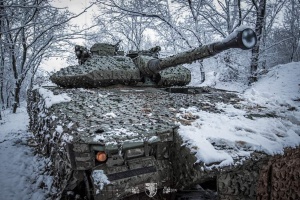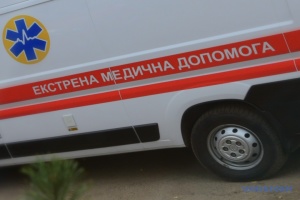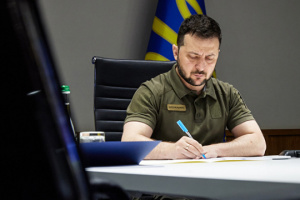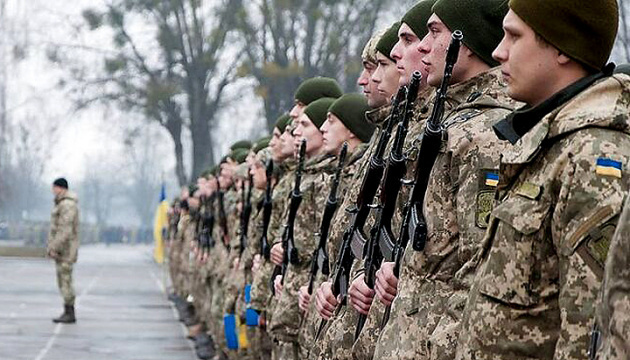
Ukraine Latest: Weekly Digest for November 4-10, 2024
MAIN EVENTS OF THE WEEK
Republican candidate Donald Trump has become the elected president of the United States. Incumbent President Joe Biden spoke with Trump on Wednesday to congratulate the president-elect on his victory and promise his administration’s full cooperation to “ensure a peaceful and orderly transition”.
COMMENT: Volodymyr Ohryzko, former Ukraine’s Foreign Affairs Minister (2007-2009), head of the Center for Russian Studies: "Trump is an entrepreneur - in his mind, his worldview. He considers each issue arising before him in terms of whether he can benefit from it or not. We should offer Trump a specific and clear plan about how much the American economy can earn by working for the interests of the Defense Forces of Ukraine... If we succeed in this, then Trump will become our ally and partner."
November 6: President Volodymyr Zelensky held a phone call with President-elect Donald Trump on Wednesday to congratulate him on his presidential election victory. "I had an excellent phone conversation with President Trump and congratulated him on his historic and decisive victory — a result made possible by his impressive campaign," Zelensky said on Telegram. "We have agreed to maintain close dialogue and strengthen our cooperation. Strong and unwavering U.S. leadership is essential for the world and for a just peace," Zelensky wrote.
The conversation between the President of Ukraine Volodymyr Zelenskyy and U.S. president-elect Donald Trump on the first day after the latter won the US presidential election shows that both sides value a joint strategic partnership, Ukrainian Foreign Ministry said in a statement.
COMMENT: Dmytro Levus, director of the Ukrainian Meridian Center for Social Studies: "This is a fully logical step made by Ukraine. Moreover, it signals that all the declarations that the country is willing and ready to work with any American administration are sincere, have a truth value. They (Zelensky and Trump – ed.) maintain personal contact, which is evidenced by this telephone conversation. The President of Ukraine appreciated the work done by Trump's team and his family, that is, it is [no longer formal liaison but] informal communication, which is very important."
November 6: President Zelensky has signed into law legislation to extend the validity of martial law and mobilization period for a further 90 days, until 7 February 2025.
November 9: President Joe Biden’s administration has allowed US defense contractors to work in Ukraine to maintain and repair Pentagon-provided weaponry. The contractors would be small in number and located far from the front lines. This decision signifies a policy shift that aims to help Ukraine fight against Russia. Washington had previously banned these companies from working in Ukraine.
November 7: President Volodymyr Zelensky, addressing the inaugural meeting of the fifth European Political Community Summit in Budapest, expressed the hope the United States will become even stronger under Trump's presidency, and that this is the kind of America Europe needs. "Yesterday I spoke with President Trump, like many of you did. It was a good, productive conversation. Of course, we cannot yet know what his specific actions will be. But we hope that America will become stronger. This is the kind of America that Europe needs. And a strong Europe is what America needs. This is a tie between allies that should be valued and must not be lost," he said. Also, Ukraine needs a sufficient amount of weapons, not just a support in negotiations with the Russian Federation, Zelensky added. On the sidelines of the summit, Zelensky met with the President of Moldova, the Prime Minister of Great Britain, the President of France and the Secretary General of NATO.
November 5: Google revealed the location of Ukrainian military sites in its latest Maps update. Moscow has already started “actively distributing” the sensitive images, Andriy Kovalenko, head of the disinformation-countering branch of Ukraine's National Security and Defense Council, said in a post on Telegram. He added in a follow-up post on Telegram that representatives for the tech giant had contacted Kyiv after a public outcry and said they were “working on correcting the situation.” The locations of military sites in Ukraine are no longer displayed on Google Maps as of November 7. "Google fixed the situation with maps... In the future, everything will be OK," Kovalenko reported via Telegram on Friday.
November 5: The recruitment center of the Ukrainian Legion in Poland has received over 500 applications from Ukrainians living in 30 countries as of early November. The Legion was unveiled in July as a volunteer military unit made up of Ukrainian men living in Poland and trained by the Polish Armed Forces. The first volunteer recruitment center was launched in October at the Ukrainian consulate in the eastern Polish city of Lublin. The unit is part of an effort to replenish the ranks of Ukraine’s's military as the all-out war with Russia goes on for over two and half years. Most applications came from Poland and the Czech Republic, but Ukrainians living in the U.K., Ireland, the U.S., and Canada also submitted requests. While the center's officials believe that not all applicants will end up signing a contract, they deem the turnout to be a good first result.
THE WAR AS IT IS
November 4/ Interview. Victory Commanders. Ivan Medvedyuk: There are no humans on the other side, the enemy are worse than beasts;
November 4/ Shorts: Kovalenko: Google has revealed the location of Ukrainian military sites in its latest Maps update, which constitutes a national security concern;
November 4/ Kherson-Kramatorsk train conductor: People are going nowhere, I want to support them;
November 6/ Station Kramatorsk. Interview: Dmytro Andryushchenko, call sign Diplomat, on reasons why soldiers choose to desert from service, on the purposes of the Kursk incursion, and on corruption related to mandatory conscription for war;
November 7/ Dolgov: Biden’s, Trump’s administrations have time to get prepared for a difficult order of events;
November 4/Lithuania handed over a batch of equipment as part of the Demining Capability Coalition for Ukraine, at a ceremony in Kyiv;
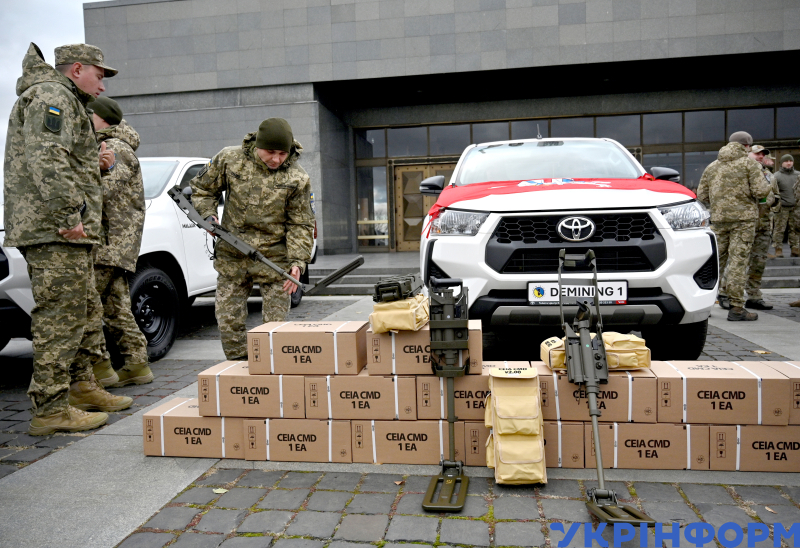
November 7/ The aftermath of the fall of Shahed drone wreckage in Kyiv’s Solomyansky District;
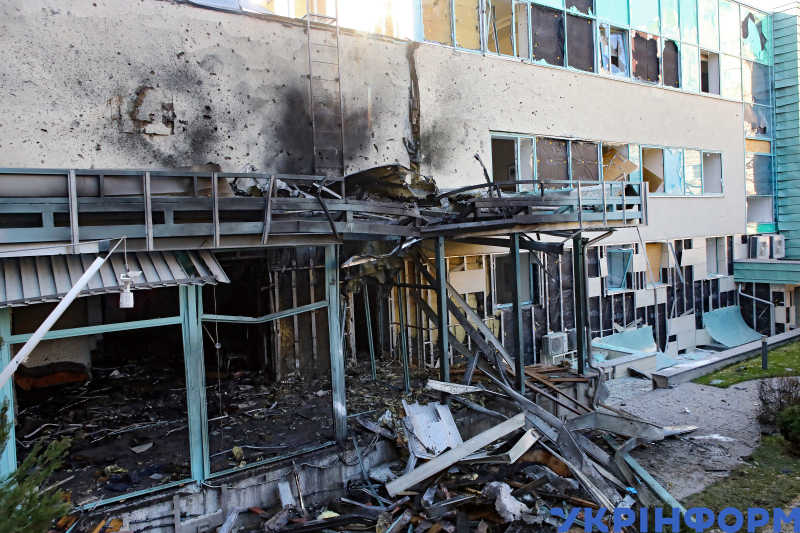
November 7/ A Russian-launched precision gliding bomb hit a residential building in Zaporizhzhia;
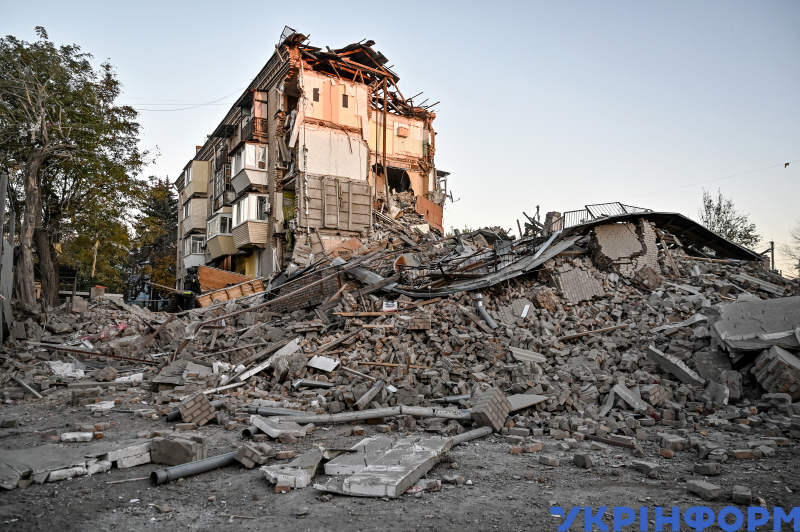
November 8/ A display of paintings by wives and mothers of fallen defenders was unveiled in Uzhhorod city;
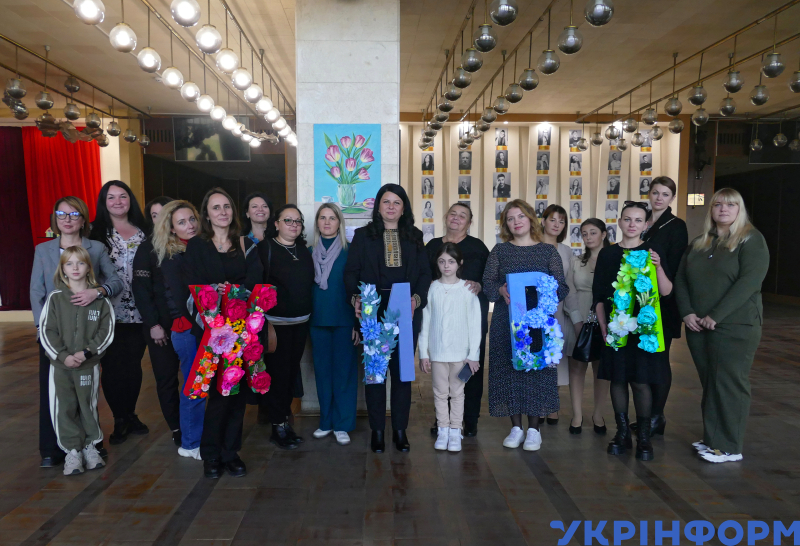
November 8/ Premiere screening of the documentary film, Bucha, was held in Ivano-Frankivsk city
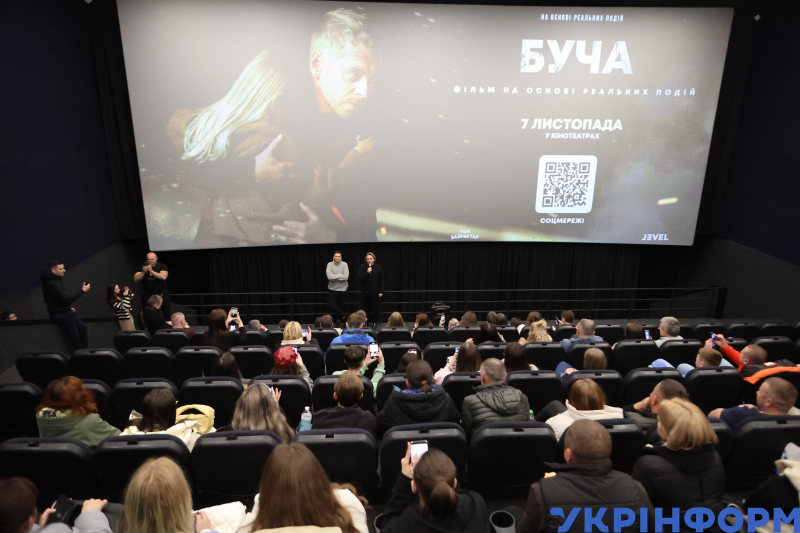
November 9/ The aftermath of a Russian drone strike on Odesa city
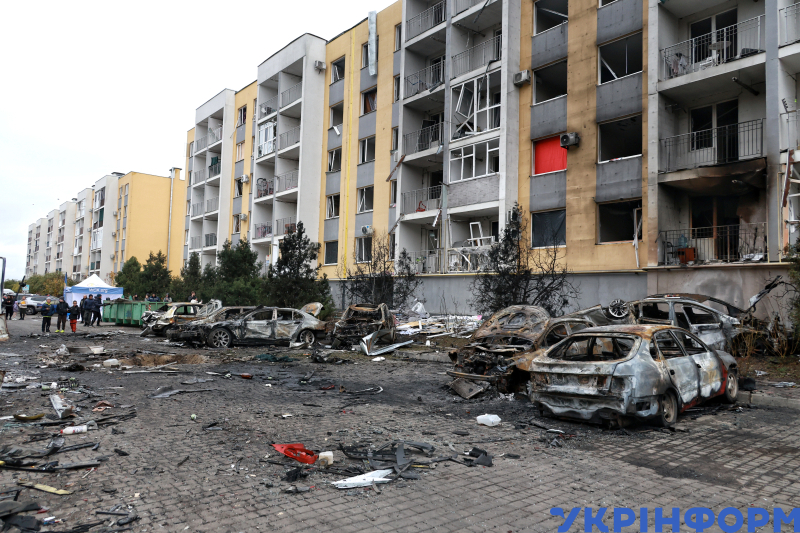
UKRAINIAN BATTLEFIELDS
Armed Forces Supreme Commander Volodymyr Zelensky:
November 4: chaired the Supreme Commander’s Headquarters meeting addressing, among other issues, the situation in key stretches of the frontline, the progress of the Kursk incursion, as well as an increase in the domestic production of UAVs.
Ukrainian attacks on the Russian Federation and Russia occupied Ukraine
November 10: Ukraine’s Defense Forces deployed a drone strike targeting a major ammunition depot in Russia’s Bryansk region, located near the Ukrainian border. The attack targeted the 1060th Logistics Center, previously known as Arsenal 120 under Russia’s Ministry of Defense, causing substantial damage. At least eight explosions and two ignition sources at the site were reported, and analysis of released footage showed fires and evidence of secondary detonations throughout the facility. As well as ammunition, the warehouses was reported to store multiple-launch rockets and precision gliding bombs. The strike on Bryansk is part of an intensified Ukrainian effort to disrupt Russian supply lines and reduce access to critical resources for Russia’s war machine.
November 6: a Ukrainian kamikaze drone (probably an A-22 Flying Fox) reached and hit Russian warships in the Caspian Sea for the first time. According to Ukraine’s Defence Intelligence service (HUR), at least two targets were engaged. These are likely the Project 11661class missile patrol ships Tatarstan and Dagestan moored at the Russian naval base in the city of Kaspiysk, which is located some 1,500 kilometers (670 miles) from the border with Ukraine. Kaspiysk is home to the Russian Navy’s Caspian Flotilla and coastal troops, including marine infantry forces. The flotilla was involved in missile strikes on civilian targets in Ukraine, and the 177th Marine Regiment partook in hostilities in Ukraine’s Kherson and Zaporizhzhia regions. Two more ships, of the smaller Project 21631 class, were reportedly damaged in the attack.
November 10: Air defense emplacements located along the line from Mariupol Airport to the village of Berdyanske in Russian occupied Donetsk Oblast came under attack overnight on Tuesday, with at least four explosions reported by the locals. Local media reported air defense operations, allegedly intercepting unmanned aerial vehicles (UAVs). Plumes of smoke were seen rising over the airport of Mariupol as a result of the explosions. At least one air defense emplacement was reportedly hit in the attack.
November 9: Ukrainian drones attacked Aleksino chemical plant in Russia’s Tula region, located at about 200 kilometers (120 miles) south of Moscow, overnight on Sunday. Follow-up explosions were reported at the facility at 1:10 p.m. Sunday. Production operations at the plant were brought to a halt and personnel evacuated after the attack, which was reportedly staged by Ukraine’s Security Service (SBU) in a coordinated effort with Special Operations Forces. Since September, Ukraine has struck several ammunition storage facilities in Russia with locally produced long-range drones. Ukrainian officials say strikes against military infrastructure, warehouses and air bases in Russia would disrupt Russian troops logistics and supplies and help turn the war in Ukraine’s favor.
An oil refinery in the Russian city of Saratov has been struck. Temporary restrictions on aircraft arrivals and departures were introduced at the local airport, according to Andrii Kovalenko, head of Ukraine's Center for Countering Misinformation. "Something has been hit in Saratov," Kovalenko wrote. Meanwhile, Russian media reported temporary restrictions on aircraft arrivals and departures at Gagarin International Airport, located in the city. Ukraine’s defense intelligence service (HUR) claimed responsibility for the attack, saying the special operation was a success.
HOSTILITIES
Armed Forces Chief Commander Oleskandr Syrsky reported that more than 52,000 Russian targets, including 129 artillery gun systems, 221 radar stations, and over 4,000 personnel were hit and destroyed or damaged in Ukrainian drone attacks during October.
In the Kursk region, the Russians forces lost seven armored personnel carriers, as many infantry fighting vehicles, one Tiger armored car and five T-72 tanks during October. As of November 6, the Russian military fighting Ukrainian forces in Kursk lost more than 20,800 troops, 7,905 of them dead and more than 700 soldiers captured as prisoners by Ukrainian forces.
The New York Times: The Russian military has assembled a force of 50,000 soldiers, including North Korean troops, as it prepares to begin an assault aimed at reclaiming territory seized by Ukraine in the Kursk region of Russia, according to U.S. and Ukrainian officials. A new U.S. assessment concludes that Russia has massed the force without having to pull soldiers out of Ukraine’s east — its main battlefield priority — allowing Moscow to press on multiple fronts simultaneously.
Ukraine has extended its basic military training program (BMT) to 45 days, allowing for more practical exercises and better preparation of recruits, the Ground Forces of the Ukrainian Armed Forces said. Initially, the BMT course lasted 30 days. The BMT is a mandatory course for all new recruits starting their service in the Ukrainian military. The training uses the NATO-standard EDIP system (explain, demonstrate, imitate, and practice), which is a well-structured modular system that can be adapted to the needs of specific units.
Russia has launched 4,300 Shahed one-way attack drones and other types of drones against Ukraine over the past three months. Of the 4,300 drones launched, 3,063 or 71 percent were shot down or otherwise neutralized by Ukraine’s air defenses.
November 10: Ukraine’s Special Operations Forces staged a successful operation in hostile territory in the Russian region of Kursk. Fourteen Russian soldiers were wiped out and three others taken into captivity in this operation.
November 5: Ukrainian officials have announced that their forces have engaged in combat with North Korean troops for the first time, a development that has taken the international community by surprise. In an interview with South Korean broadcaster KBS, Ukrainian Defence Minister Rustem Umerov confirmed that a "small group" of North Korean soldiers faced Ukrainian attacks near the frontline. Umerov indicated that these troops, currently undergoing training and tactical exercises wearing Russian uniforms, may soon be deployed in significant numbers. President Volodymyr Zelensky has expressed concern over the lack of international response to the increase of North Korean military presence, estimating that approximately 10,000 North Korean troops are stationed in Russia's Kursk border region. He described these initial encounters as heralding a new era of global instability.
November 4: Russians are using the same tactics they are using in Ukraine — a scorched-earth, a zero-ground approach that has left dozens of Ukrainian towns in ruins. But the Russian bombs are now destroying Russian houses. The Russian military launch up to 1,000 bombs on the embattled Kursk region daily.
November 10: Ukrainian assault troops defeated an armored assault by Russian forces from the 1st Tank Regiment, in a battle that took place in the surroundings of the village of Kruhliakivka near Kupyanks, the Kharkiv front. Some 120 Russian troops were taken out in this battle.
Russian troops cannot advance toward the embattled towns of Chasiv Yar and Toretsk in Donetsk Oblast, despite daily assaults, and the line of battle had been stabilized as of November 4, a spokesperson for the Operational Tactical Group Luhansk said. She refuted Russian claims that the two towns had been captured by Moscow's forces. Toretsk and Chasiv Yar have remained the focus of Russia’s offensive on Donetsk Oblast in recent months as Russian troops continue advancing in Ukraine’s east.
Russian forces have seized over 1,000 square kilometers of Ukraine’s territory over the past two months, according to War Mapper. As of the end of October, Russia holds under its control 17.95% of Ukraine’s territory, including the Crimea peninsula and parts of the Donetsk and Luhansk regions it had occupied before 2022.
Russia is unleashing near-constant waves of long-range drone strikes on Ukrainian cities as its troops advance in the east, as President Volodomyr Zelensky warned Moscow was firing about 10 times as many drones as it did last fall. As well as drastically increasing the number of strikes, Russia has begun to deploy decoy drones without warheads to overwhelm Ukraine’s air defenses. The decoy drone carries a “3D-printed ball wrapped in foil” to make it look like an Iranian-made Shahed-136 drone, Yuriy Ihnat, a spokesman for Ukraine’s air defenses, said. These cheaper drones confuse Ukraine’s air defenses, which may shoot down decoy drones instead of ones carrying a lethal warhead. Decoy drones now account for as many as half of all the drones deployed by Russia against Ukraine, Ihnat said.
COMMENT: Oleksandr Kovalenko, defense analyst at the Information Resistance group: "In decoy drones (cheap, made almost holy of plastic, styrofoam, - ed.) the occupiers use makeshift Lüneberg lenses that simulate an object similar to a Shahed-136 kamikaze drone. And until you hit it, you won't understand, especially at night, if it is a genuine Shahed or a decoy drone. That is why we are in a situation where 2,000 drones are launched on Ukraine every month, as was the case in October. And among these 2,000 drones recorded by the statistics, there are not only self-explosive drones, but also the decoys, which are pretty difficult to identify quickly”.
The Russian military are suffering huge losses in the Kursk region, but they are still unable to push through Ukrainian defenses there. Our defense line remains frozen in place, and Russia's bolstering its military’s manpower with North Korean forces has not affected the morale of the Ukrainian troops.
In the Vremivka stretch of the frontline, the Donetsk region, the Russians are using armored vehicles to deliver assault troops to the battlefield.
On the Kharkiv Front, the enemy is attacking mainly with infantry; it amasses forces and capabilities, brings in ammunition, equipment, food, warm clothes and heating equipment, fuel and lubricants.
November 6: Soldiers from the 47th Independent Mechanized Brigade fighting in the Kursk region of Russia captured a Russian soldier from the Pacific Fleet’s 155th Marine Infantry Brigade, who said had eyewitnessed executions of Ukrainian POWs by Russian troops. As yet, it is unclear whether the detained Russian, who named himself as Yuri Pitkevich, took part in the executions. Pitkevich said he had witnessed the killing of two Ukrainian soldiers who surrended near the village of Glushkovo, the Kursk region, in late September. The order for their execution and subsequent beheading was given by the commander of his unit, Pitkevich said. He has revealed the identity of the commander in question and has also named the soldiers who were directly involved in this war crime.
November 7: The Russians are using a large number of drones and almost all driveable vehicles at their disposal for advancing in the Kurakhove sector of the front.
November 7: Russian Major General Pavel Klimenko, who was in command of the Aleksandr Zakharchenko 5th Separate Motorized Rifle Brigade (formerly known as Oplot Battalion of the DNR army), was killed in the war in Ukraine.
The Ministry of Defense gave approval to deployment of the locally made armored vehicle UAT-TISA to the Armed Forces’ units. The new vehicle is suitable for a wide range of roles, depending on additional gear and equipment. "UAT-TISA adopts the chassis of a proven off-road vehicle of one of the well-known car manufacturers. It features a custom-made armored capsule to protect the crew and pasengers from small-arms fire. The design of the armored capsule allows for the installation of a machine gun and a turret. The vehicle’s mine protection system withstands a detonation underneath the wheel and car bottom," the ministry said in a press statement, adding that UAT-TISA boasts a range of over 1,000 km, being highly dynamic, maneuverable across various terrains, and smooth in operation.
The Ukrainian Armed Forces are expecting that Russian forces will soon launch offensives on Ukrainian positions along specific sections of the front line. The most “dangerous” areas identified are the Vremivka front and an area near Hulyaipole in Zaporizhzhia Oblast. The Russians are conducting aerial and engineering reconnaissance, and several assault groups have been moved to forward positions, according to Southern Defense Forces spokesperson Vladyslav Voloshyn. The Vremivka front is strategically significant due to its proximity to other key locations, such as Kurakhove and Vuhledar, and has been a focal point for military operations and fierce clashes between the opposing parties. “According to our intelligence, Russian forces are actively preparing for assault operations on specific sections of the front line. They have brought in reinforcements, resupplied ammunition, and are conducting aerial and engineering reconnaissance of our positions, indicating preparations to initiate assault actions. Some assault groups have already moved to forward positions. Such actions suggest that the enemy will soon begin attacking our positions. However, this will be a limited offensive -- assault actions will likely start on one segment of the frontline,” Voloshyn said, adding that the most concerning areas are those located along the Vremivka axis, near the villages of Levadne and Rivnopil, and near Hulyaipole in Zaporizhzhia Oblast.
November 8: Russian forces in Ukraine have suffered their deadliest month since the start of the full-scale invasion, the U.K.'s defense minister said in an interview published Friday. Speaking to The Telegraph, John Healey said that Moscow's troops suffered 41,980 killed and wounded during October, according to British defense intelligence figures. This works out at an average of 1,354 every day. British defense intelligence estimates Russia has likely suffered more than 696,000 losses since the start of the all-out invasion, a figure in line with Ukraine's current total figure of 707,540 reported as of Nov. 9. The daily figure reported by Kyiv was 1,660, the second highest of the war. The previous second highest was 1,630 reported on Oct. 25, which surpassed the previous record of 1,530, which was set just a week earlier. The bloodiest day for Moscow's forces was on May 13, when they suffered a reported 1,740 casualties.
THE WEEK IN NUMBERS AND PICTURES
Air attacks by Russia on the Ukrainian regions of Donetsk, Kherson, Chernihiv, Dnipropetrovsk, Zaporizhzhya, Mykolaiv, Sumy and Kharkiv killed 15 civilians and left 67 others injured over the week under review.
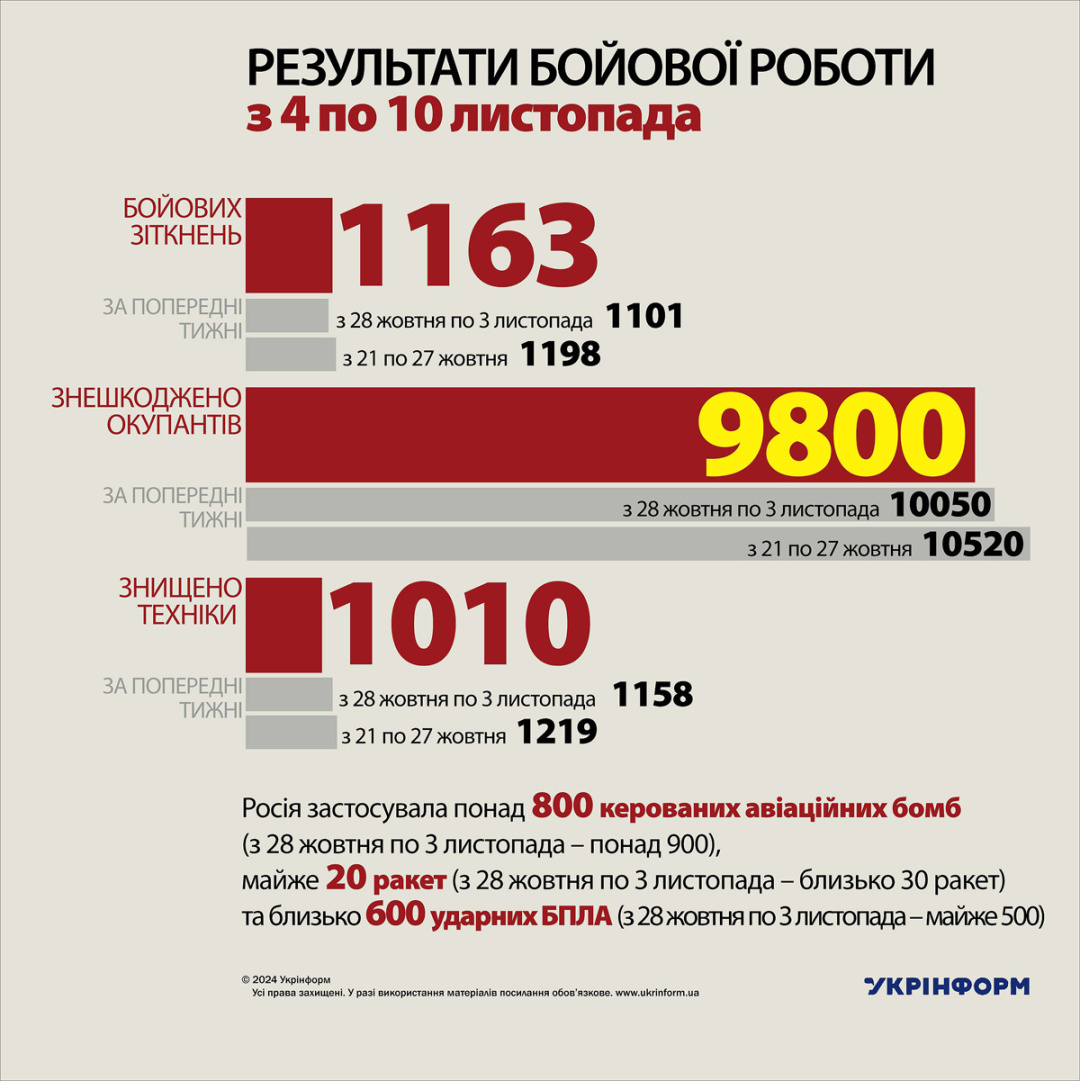
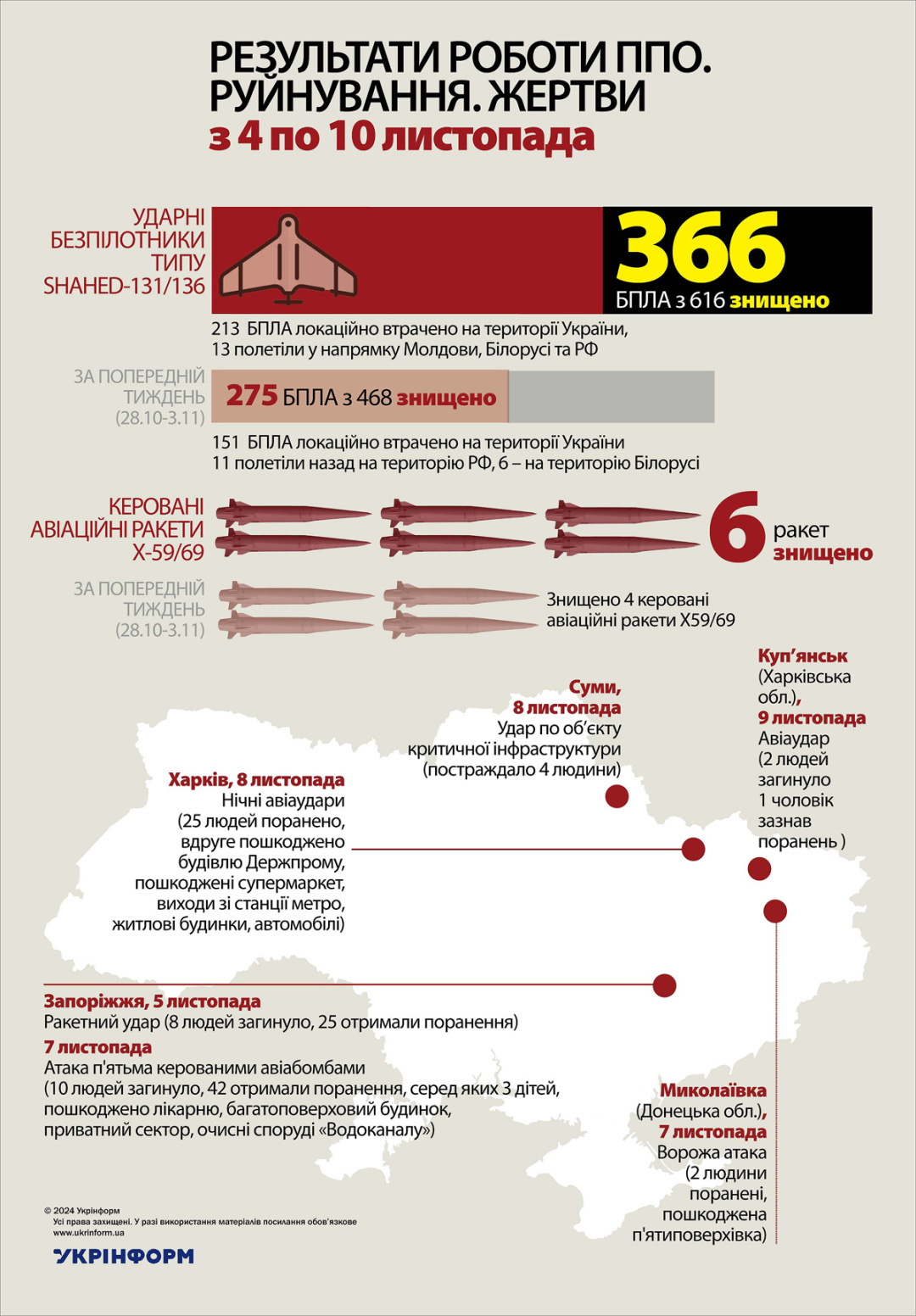
WAR AFTERMATH
Human losses & war crimes
The Russian Federation agreed on a visit by the Chief Ombudsman of Turkey, Sheref Malkoç, who, as in Ukraine, will visit places where prisoners of war are held. The date for the visit has not been set as of yet. This is according to Dmytro Lubinets, Ukraine’s Commissioner for Human Rights. The ombudsman spoke about his meeting with families of captured servicemen from military unit 3033, which took place on November 5. “In response to the question, ‘Is our side aware of the health condition of our prisoners of war’, my representative noted that Russia still does not comply with the Geneva Conventions. We can see this from the condition in which the soldiers return home after being released from captivity in Russia”.
Over the time of the all-out Russia’s war in Ukraine, 1,068 civilians have suffered injuries caused by land mines and other explosive hazards.
The adversary deployed 323 attacks on Ukrainian troops using ammunition containing chemical agents during October.
November 8: Ukraine has repatriated the bodies of 563 soldiers who died fighting against Russia, the Coordination Headquarters for the Treatment of the Prisoners of War reported on Friday. The Geneva Conventions stipulate that those soldiers who died in war are entitled to a dignified burial. As of early March, Ukraine had identified more than 2,800 bodies and body fragments of fallen soldiers, according to Ombudsman Dmytro Lubinets. The bodies of 320 soldiers were recovered from Donetsk Oblast, 89 were brought back from Zaporizhzhia Oblast, while 154 others were retrieved from morgues in Russia. Russia did not return the body of journalist Victoria Roshchyna, who died in captivity in Russia, to her homeland, despite having promised to do so, during the most recent swap.
Since the inception of the all-out war in February 2022, Russia’s war has killed 57 journalists in Ukraine, among them 8 members of international media, and left 45 others injured.
November 5: Russian occupying forces executed six Ukrainian soldiers they captured on the Pokrovsk front. Law enforcement have launched an investigation, the Office of the Prosecutor General reported Tuesday. "Real-time data suggest that during an offensive on the town of Selydove on October 23, 2024, Russian troops captured three Ukrainian warriors, then executed them unarmed," the report says. A week later, during an offensive on Ukrainian lines, also on Pokrovsk front on November 1, Russian invaders killed with automatic weapons three Ukrainian soldiers who surrendered into captivity near the settlement of Vyshneve. The Office of the Prosecutor General emphasizes that these actions are violations of the Geneva Conventions and constitute a crime punishable by international law. As reported, Russian troops killed four National Guard servicemen, wounded and unarmed, nearby Selydove. Some time later, also in the Selydove area, Russians executed two Ukrainian POWs. Ukraine’s law enforcement are also investigating the execution of 16 Ukrainian soldiers captured by Russians in the Pokrovsk axis. This has become the largest mass killing of captured Ukrainian soldiers since the war got started in February 2022. Overall, 49 criminal cases involving the killing of 124 Ukrainian soldiers immediately after surrender on the battlefield have been under investigation in Ukraine.
Culture
A total of 1,179 objects of cultural heritage in Ukraine have sustained damage due to the Russian invasion beginning in February 2022, among them 10 objects damaged during October.
Russia’s war has killed 132 workers of art and 93 media professionals in Ukraine since it got started in February 2022, according to statistics from the Ministry of Culture and Strategic Communications.
Economy
DTEK Ukrenergo has invested UAH 2.6 billion so far in 2024 in projects to repair and rebuild the thermal power generation capacities bombed-out in missile and drone attacks by Russia, with the amount total of the investment expected to reach UAH 3.8 billion by year’s end.
UKRAINIAN HOME FRONT
President Volodymyr Zelensky:
November 7: in an address to the Kyiv International Economic Forum, said that the economic component is a key element of the internal Plan for Strengthening Ukraine;
November 4: Following a phone call with the Prime Minister of Canada, Justin Trudeau, announced the dispatch of the first NASAMS air defense system, ordered by Canada for Ukraine, with the delivery expected by the end of this year;
November 5: held a meeting to discuss the military component to the internal Plan for Strengthening Ukraine.
***
Visits to Ukraine
November 4: German Foreign Minister Annalena Baerbock arrived in the Ukrainian capital, Kyiv, on an unannounced visit on the eve of the U.S. presidential election that could bring far-reaching changes in Washington’s policy toward Russia’s all-out invasion of Ukraine. In Kyiv, President Volodymyr Zelensky discussed with Germany’s top diplomat the situation of Ukraine and the ways to exert pressure on Russia to bring peace closer. "The main topics of discussion were military support, investments in Ukraine’s defense, and the challenges we face ahead of winter. We appreciate the significant military and financial assistance provided by the German government to Ukraine. We are counting on Germany to further strengthen its defense support for Ukraine in the coming year, as this is critically important for our victory," Zelensky said following his talks with Mrs Baerbock. During the visit, the German FM also met her Ukrainian counterpart, Andrii Sybiha. Following the meeting, Sybiha said the delegations discussed the "need for decisive action" in response to the presence of North Korean troops deployed along Ukraine's eastern frontline. "We urge Europe to realize that the DPRK troops are now waging a war of aggression in Europe against a sovereign European state," Sybiha told reportersg. Annalena Baerbock, speaking at a press conference alongside her Ukrainian counterpart in Kyiv, announced that her government would increase their emergency humanitarian aid by an additional EUR 200 million in winter emergency support.
November 5: During his visit to Kyiv this week, Swedish Civil Defense Minister Carl-Oskar Bohlin announced an aid package worth 100 million Swedish kronor (approx. US$9.33 million) for Ukraine. In Kyiv, Mr Bohlin signed a Memorandum of Understanding with Ukraine's Minister of Internal Affairs, Ihor Klymenko, and unveiled the new package of civil support for Ukraine. The package includes two patrol vessels, 24 vehicles, a minibus, a heavy truck, and personal protective gear provided by the Swedish Coast Guard, as well as 40.000 protective masks with filters purchased for Ukraine.
November 9: The EU High Representative for Foreign Affairs and Security Policy Josep Borrell arrived in Ukraine on his last visit as the EU foreign policy chief. In Kyiv, he met Ukrainian Prime Minister Denys Shmyhal, the Verkhovna Rada Speaker Ruslan Stefanchuk, and Defense Minister Rustem Umerov. At a press conference alongside Foreign Minister Sybiha, Mr Borrel said that there is still no consensus reached among EU member states on relocating the EU Military Assistance Mission in support of Ukraine (EUMAM Ukraine) to Ukraine’s territory. “We still don’t have a consensus among member states in order to make this request fulfilled, but it doesn’t prevent the training mission from continuing," he said when asked whether European instructors could be sent to Ukraine in response to the involvement of North Korean troops in Russia's war against Ukraine. Borrell announced that the EU military training mission for Ukraine will have trained 75,000 Ukrainian soldiers by the end of the year. "We try to train Ukrainian soldiers as close as possible to the Ukrainian border, but this is not per se a defensive mission [...] There's currently no consensus on doing that on Ukrainian territory. I cannot exclude that this will happen. But my job is to ensure the mission works and increase the number of Ukrainian soldiers being trained," the EU chief diplomat added.
***
November 4: The head of Ukraine’s Presidential Office, Andrii Yermak, in a national TV broadcast, said that Ukraine is not engaged in any negotiations with Russia. He thus responded to claims circulated by several media outlets that Ukraine and Russia are allegedly negotiating an agreement to halt strikes on each other’s energy and power infrastructures.
November 4: Ukraine’s Foreign Ministry refuted as groundless the statements by Polish Deputy Prime Minister Krzysztof Gawkowski regarding President Volodymyr Zelensky's alleged intention to get Poland involved in a war with Russia. By asking Poland to shoot down Russian missiles over Ukraine, President Volodymyr Zelensky is attempting to get Warsaw involved in the war, Gawkowski said in an interview with Radio ZET on Monday. Gawkowski's comments came amid a growing diplomatic spat between Kyiv and Warsaw, revolving around the Polish support for Ukraine as well as historical grievances. "Zelensky wants Poland to shoot down missiles and drones over Ukraine, which means he wants Poland to enter the war, which means he wants Poland to be at war with Russia," he said. Zelensky recently slammed Poland for not yet providing its remaining MiG-29 fighter jets despite previous agreements.
November 4: Ukraine’s Foreign Minister Andrii Sybiha, at a ZOOM conference meeting with the heads of Ukraine’s diplomatic missions in foreign countries, expressed his dissatisfaction with the passivity of Ukrainian ambassadors to the majority of Arab and African countries. Sybiha said, in particular, that, during his recent tour of the Middle East and Africa, he was extremely surprised to hear the Sultan of Oman and top leaders of Angola asking whether it’s true that Ukraine has currently been at war.
In Ukraine, 82% of all boiler houses have been operating, and 70 percent of all apartment buildings provided with centralized heat supply as of November 5.
Cabinet of Ministers:
- dismissed Yuri Dzhyhyr as Deputy Minister of Defense at his own request;
- endorsed a new program to support the defense-industrial sector: the program makes critical enterprises eligible for loans of up to UAH 500 million for up 5 years at 5 percent per annum interest; The funds can be spent either on replenishment of working capital or on the implementation of investment projects. Currently in Ukraine, more than 500 defense industries are working producing a broad variety of defense-related products, including ammunition, drones, artillery guns, and armored vehicles;
- included telecommunication service providers into the list of entities exempted from scheduled power cuts;
November 7: Flights from one of Ukraine’s airports, Lviv or Boryspil, will resume by the end of January 2025, Crispin Ellison, senior partner at Marsh McLennan said while speaking at the Kyiv International Economic Forum (KIEF) Thursday. “I think if we’re lucky, in January (2025) we’ll have five or six airlines that want to fly [from Ukraine],” Ellison said. He said he believes it will be easier to provide insurance mechanisms for aviation if planes start flying from Lviv airport, but President Volodymyr Zelenskyy insists that Boryspil International Airport should be reopened first. “The president will hate me for saying this, because he is focused on Boryspil, but the initial focus is on Lviv. It’s a seven-minute flight from Poland,” said Mr Ellison.
COMMENT: Kostyantyn Kryvolap, aviation expert: "At a minimum, it is necessary to secure a sufficient concentration of air defense protection, at the maximum - take into account that this will not provide 100 percent protection anyway, and this will affect the cost of flights. The higher the probability of attacks, the higher the cost of insurance will be. At some point, the cost of insurance becomes such high that there is no point in making the flight at all."
November 8: Ukraine’s Defense Ministry has received the first patent for the groundbreaking “Vitryak M” technology, an innovative device designed to detect and neutralize enemy First Person View (FPV) drone threats.
November 8: Ukrainian Ombudsman Dmytro Lubinets met with his Russian counterpart, Tatyana Moskalkova, in Belarus on Friday to discuss humanitarian issues related to Russia's full-scale war against Ukraine. The public meeting between Ukrainian and Russian officials in Belarus -- Russia's ally, which has allowed the Kremlin to use its territory as a staging ground for its military operations against Ukraine — appears to be the first since March 2022. Representatives of the International Committee of the Red Cross attended the talks. "I interacted with the Russian ombudsman to resolve humanitarian issues, return Ukrainians home, and obtain information about our citizens in Russia," Lubinets said. During the meeting, the parties swapped the bodies of fallen soldiers. Kyiv received 563 bodies, while Russia received 37. The two ombudsmen introduced a new initiative, exchanging letters from Ukrainian relatives to Ukrainian prisoners of war (POWs) in Russia, according to Lubinets. They also exchanged lists of the POWs visited by both sides. Since the break-out of Russia’s full-scale invasion of Ukraine in 2022, the two countries have regularly exchanged prisoners, with the most recent swap occurring in mid-October, when each side returned 95 prisoners. The exact number of Ukrainian servicemen and civilians held in Russian captivity has not been made public. In late June, Lubinets reported there were more than 14,000 Ukrainian civilians held in captivity in Russia.
November 9: The State Bureau of Investigation is conducting a pre-trial investigation into the circumstances of the F-16 fighter jet crash that killed star pilot Oleksiy Mes. Investigators have ordered 11 forensic examinations as part of the investigation. Ukrainian F-16 fighter pilot Oleksiy Mes died while repelling a massive Russian missile strike on August 26, 2024.
November 9: The feature to submit an application for deferment from mandatory conscription during mobilization period will be available in the latest update of the "Reserve+" mobile app. beginning this month. The Ministry of Defense is making efforts to ensure the availability of online deferment applications for all categories of servicemen who are eligible. Thus, "Reserve+" is expected to become a full-fledged alternative to military enlistment offices.
November 4: Soldiers from HUR’s special operations units Artan and Shaman, who suffered injuries while at war, took part in the United States Marine Corps marathon. The event, held annually in Washington, D.C., and Arlington, Virginia, brings together thousands of participants from around the world. The Ukrainian servicemen dedicated their participation in the marathon run to their fallen comrades and reminded everyone that the war for a democratic and free Ukraine continues.
November 6: The Kyiv National Taras Shevchenko University has banned its employees from using the messaging app Telegram on their work devices;
November 4: At the "Sikorsky Challenge 2024: Innovations for Peace and Security of Ukraine" festival in Kyiv, startups capable of strengthening Ukraine’s Defense Forces by ensuring technological dominance on the battlefield showcased their projects. The festival was attended by representatives from the Armed Forces of Ukraine, defense industries, leading foreign companies, research associations, international foundations, investment firms, and universities. Among the technology projects of the highest priority for the Defense Forces are innovative developments in electronic warfare, unmanned aerial systems, ground robotic systems, as well as artificial intelligence.
November 6: Ukrainian cardiac surgeon Illya Yemets has been included on the Top 100 List of the world’s best specialists in treating congential heart defects and become an honorary member of the US Congenital Heart Surgeons’ Society (CHSS);
November 4: Ukraine’s Ministry of Internal Affairs and the US Embassy in Kyiv agreed to step up collaboration in conducting DNA testing to identify individuals who died in the aftermath of Russia’s war against Ukraine, in an effort to bring Russia to justice.
WAR ECONOMY
The Cabinet of Ministers submitted to the Verkhovna Rada the draft law "On the State Budget of Ukraine 2025", updated for second reading – Cabinet of Ministers’ official website.
The amount of merchandise exports from Ukraine exceeded USD 3.8 billion in October – a record high monthly amount for exports in year 2024.
The National Bank of Ukraine (NBU) has transferred nearly UAH 37.8 billion from its special account for defense needs over the time of the all-out war, including over UAH 563.4 million transferred during October.
UAH 1.67 trillion worth of revenues has been transferred to the base part of the National Budget during the first ten months of 2024;
Ukraine’s international reserves declined by 6 percent in October, down to USD 36.6 billion;
The amount of taxes on the production and sale of alcoholic beverages that had been transferred to the NBU accounts during January-October 2024 grew by 43.5 percent year-on-year.
As part of preparations for the cold season, the Government agreed with partners to increase electricity imports to 2.1 GW and the additional volume of "emergency support".
According to EnergyMap portal, Ukraine reduced electricity imports by 58% to 181.800 MWh in October from the previous month, but increased exports by 88 times - up to 60.700 MWh.
In October, consumer prices increased by 1.8% from September, while annual inflation rate had accelerated to 9.7%.
ALLIED AND PARTNERS’ AID
November 7: The UK has announced a wave of new sanctions against Russia's military industrial complex and Russian-backed mercenary groups, further restricting the supply of vital military equipment Putin desperately needs for his illegal war in Ukraine. The UK announced 56 new sanctions in its largest sanctions package against Russia since May 2023. New targets include suppliers supporting Russia’s military production, Russian-backed mercenary groups operating in Sub-Saharan Africa and the GRU agents involved in the use of a Novichok nerve agent in Salisbury. These sanctions will directly target the supply of goods to Russia’s military and constrain vital resources crucial to conduct Putin’s illegal war in Ukraine.
November 10: The United States will ship more than 500 interceptor missiles to Ukraine in the weeks ahead, speeding up Washington's military aid delivery amid fears that the Trump administration could end previously approved support. Before the U.S. presidential election, the U.S. administration had been aiming to deliver the remainder of its aid to Ukraine by April. The delivery of the interceptors for the Patriot missile defense system and the National Advanced Surface-to-Air Missile System, or NASAMS, should meet Ukraine's air defense needs for the rest of this year.
November 7: South Korean President Yoon Suk-Yeol said that his country is not ruling out sending weapons to Ukraine, but the decision will depend on the “level of North Korea’s involvement in Russia's war against Ukraine”.
November 8: NATO Allies strongly condemn the decisions by the leaders of the Russian Federation and the Democratic People’s Republic of Korea (DPRK) to dangerously expand Russia’s unprovoked war of aggression against Ukraine. In addition to the DPRK’s already substantive support to Russia’s war effort, through the provision of millions of rounds of ammunitions and ballistic missiles, the thousands of combat troops deployed by the DPRK constitutes a dangerous expansion of its ongoing support for Russia’s illegal war of aggression against Ukraine. The deepening military cooperation between Russia and the DPRK deeply impacts Euro-Atlantic security, with implications also for the Indo-Pacific. Australia, Japan, New Zealand, the Republic of Korea and Ukraine associated themselves with this statement.
November 10: France is set to send Ukraine an additional batch of SCALP missiles and Mistral air defense missiles, French Defense Minister Sébastien Lecornu said in an interview published on Nov. 9 in Le Journal du Dimanche. “We must sustain our support over the long term because it will enable Ukrainian authorities to consider political solutions when they are ready. Military aid is crucial, and even when the war ends, we must continue to strengthen the Ukrainian army,” Lecornu said. He also noted that the French government will keep training Ukrainian Defense Forces personnel on French military ranges.
November 5: Australia will transfer 14 Rigid Hull Inflatable Boats (RHIB) to Ukraine as part of a $14 million military aid package. The Australian Defence Force sea boats will help build the Armed Forces of Ukraine's littoral capabilities. "Australia remains firmly committed to supporting Ukraine in its fight against Russian aggression. This is in Australia’s interests, and is the right thing to do," said the Minister for Defense, Richard Marles. “Ukraine has demonstrated its ability to thwart Russia’s continued attacks from the Black Sea. We are proud to contribute to these vital maritime defences with this new package.”
November 5: The European Union’s anti-fraud office, OLAF, has opened an investigation into a loophole allowing countries like Turkey to export sanctioned Russian oil to the bloc under a different label. The probe comes after it had been revealed that millions of barrels of Moscow’s fuel were likely arriving in the bloc after being rebranded in Turkey, despite its ban on such Russian imports. The scheme is possible because of a workaround in Brussels sanctions that allows “blended” fuels into the EU if they’re labeled as non-Russian. The loophole generated up to €3 billion for Moscow from three Turkish ports alone in the 12 months after the EU sanctioned Russian oil imports in February 2023.
November 7: The Franco-German defense group KNDS has announced plans to deliver advanced RCH 155 wheeled howitzers to the Ukrainian army in April 2025. The RCH 155 is a state-of-the-art, self-propelled remote-controlled howitzer built on the chassis of the German-Dutch Boxer multi-purpose armored personnel carrier (APC). This integration ensures a high degree of mobility, survivability, and protection against mines and improvised explosive devices (IEDs).
November 6: Lithuania will ease the conditions to purchase weapons by public administration entities for the needs of Ukraine. To this end, the Cabinet of Ministers of Lithuania has decided to submit amendments to the relevant law to the Seimas. If the amendments to the law on arms and ammunition control are adopted, Lithuanian public administration entities will be able to organize the purchase of category A weapons, arms accessories, and ammunition for Ukraine. The amendments to the law are intended for the Central Project Management Agency (CPMA), which facilitates the implementation of joint EU support projects for Ukraine and conducts public procurement procedures. The reasoning behind this is that, according to the current procedure, the activities of an intermediary, in this case, the CPMA, are prohibited for category A weapons.
November 8: the Council of the European Union adopted a decision extending the mandate of the European Union Military Assistance Mission in support of Ukraine (EUMAM Ukraine) for a further two years. The budget allocation for the period from 14 November 2024 to 15 November 2026 will amount to almost €409 million.
November 4: German Chancellor Olaf Scholz, at a meeting with NATO Secretary General Mark Rutte in Berlin on Monday, reiterated his opposition to Ukraine's accession to NATO.
November 4: Ukraine signed a new agreement with the World Bank for the 'Sustainable, inclusive and ecologically balanced entrepreneurship' (RISE) program, allocating nearly 600 million US dollars. The RISE program aims to support small and medium-sized businesses, green transition, improvement of the business environment, and digitization, running until 2027 with a total planned amount exceeding 1 billion US dollars.
November 7: The World Bank announced a new $750 million support package for Supporting Reconstruction through Smart Fiscal Governance (SURGE) that aims to assist the Government of Ukraine in improving its public investment management system at the central level and enhancing public financial management and fiscal governance at local and regional levels.
November 4: USAID Competitive Economy Program has announced USD 1.8 million initiative to enhance employment opportunities for Ukrainians. The initiative promotes a demand-driven upskilling and reskilling approach in Ukraine.
Warsaw will not hand over its remaining MiG-29 jets to Kiev since it still needs the planes for its own security.
The former Commander-in-Chief of the Armed Forces of Ukraine and the current Ambassador of Ukraine to the United Kingdom, Valerii Zaluzhnyi, believes that the primary strategy for achieving victory in the future is the establishment of a "resilience" system in the country. He argues that the rapid advancement of technology paves the way for a war of attrition. In such a scenario, political objectives are achieved through the depletion of the opponent's resources. Zaluzhnyi shared these insights at an international defense seminar organized by the Royal Netherlands Army and the Bundeswehr. The event was dedicated to discussing defense prospects and preparing for the challenges of 2030.
WAR&LIFE
November 5/ Ukrainian Legion: Over 500 applications from Ukrainians living in 30 countries had been submitted in just one month
November 7/ Volodymyr Ohryzko, former Ukraine’s Foreign Ministry, head of the Center for Russian Studies:"...we will work to ensure that Donald Trump is on our side, on the bright side of history. And it should be done right now, when the administration of the new president and the new composition of the Congress are just beginning to take shape. That is, to take a proactive, not a waiting position. Create new contacts, meet, convince..."
November 7/ Russia closing prisons because of its war in Ukraine
QUOTE: "Currently, there are about 300,000 - 350,000 inmates held in prisons and penal colonies in the Russian Federation. This is half as many as was 10 years ago. The main reason is the war in Ukraine."
November 7/ Trump returns to the White House: What is Ukraine in for?
QUOTE: "It is not yet known what the foreign policy agenda of the new administration will be like. You can, of course, look at the previous experience of his presidency, as well as Trump’s campaign statements, but the foreign policy of the new administration will be determined mainly by the team the president elect will choose, most particularly the new Secretary of State, Secretary of Defense, National Security Advisor and other high-ranking members of the White House Security Council."
November 7/ Resumption of commercial air traffic over Ukraine: how and when it can happen
QUOTE: "Despite military risks, Ukraine does not stop trains, but they are very slow, unlike airplanes. However, for some reason, everyone decided that aviation is more dangerous. This is not entirely correct in terms of risk assessment. Especially since there are technologies to make flights safer even in the current curcumstances. What matters most in this context is to choose the appropriate locations for air defenses and calculate the cost of insurance."
Compiled by Maryna Dmytriv, Kyiv

